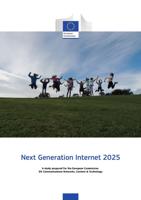Next Generation Internet 2025: where next?
- Track: Main Track - K Building
- Room: K.1.105 (La Fontaine)
- Day: Sunday
- Start: 09:00
- End: 09:50
- Video only: k1105
- Chat: Join the conversation!

In 2018 the study "Next Generation Internet 2025" was presented at FOSDEM to MEP Marietje Schaake by a team from NLnet Foundation and Gartner Europe. At that point in time, the Next Generation Internet initiative was just about to get started. The report laid out a practical vision for what such an initiative could aim to become - based on input from a consultation by the authors across the European tech and digital rights community.
At the time Europe had made some inroads on tech regulation, but was nowhere in terms of untangling its own technical debt. The hope was for NGI to put at least some public funding to work to make technology more human centric and develop concrete FOSS alternatives. Just a few years before, the vast threats to our privacy and security had been painfully highlighted by the revelations of whistleblower Edward Snowden.
The unspoken ambition for NGI was to start reducing Europe's dangerous dependency on big tech companies running dark code in foreign jurisdictions. The report defined a number of strategic objectives and considerations, centered around user empowerment - and with an underlying ambition to improve our digital sovereignty and create the technology stack we want.
So, now it is 2025. So where do we stand? In this talk, Michiel Leenaars, project lead and co-author of the original "Next Generation Internet 2025" study, will look back on how the Next Generation Internet initiative worked out so far - and where it can and should go next. With hundreds of thousands of developer hours funded across all layers of technology through programmes like NGI Zero, the Next Generation Internet has pushed technological sovereignty more than any other EC supported effort. Check. Hundreds of projects ranging from free and open source videoconferencing, open social media, libre chip technology, productivity tools, post-quantum cryptography, tools to improve the software supply chain, podcasting and many more have been spawned - making it one of the largest FOSS programmes ever to exist. Check. An impressive amount of pretty hex stickers now adorns the laptops of many European software developers and their kids, making them the nicest looking hackers on the planet. Check. The Next Generation Internet it seems has delivered, but so far is not included in the European Commissions plan's for future programmes. Erm?
Our problematic technological entanglement isn't solved yet, in fact: the situation is arguably more dire than ever. The geopolitical climate calls for technological disentanglement and a strategic move to free and open source software and digital commons, but what concrete steps are taken in Europe at the decision level? An embarrasing low came from the European Commission itself, as it is now suing its own data protection supervisor, after it was concluded that the current use of Microsoft Office 365 isn't according to European legislation - and so the EC should not be using that expensive, insecure and non-confidential cloud service. If you have to sue your own guardian angel because you cannot do without a digital typewriter and an app doing calculations on tabular data hosted on another continent, you are probably fairly desperate. So what should our new European Commissioner Henna Virkkunen, executive vice-President for Tech Sovereignty, Security and Democracy be working on for the next five years of the 'digital decade'? Starting from the vantage point of the Next Generation Internet initiative in 2025, where do we go?
Speakers
| Michiel Leenaars |